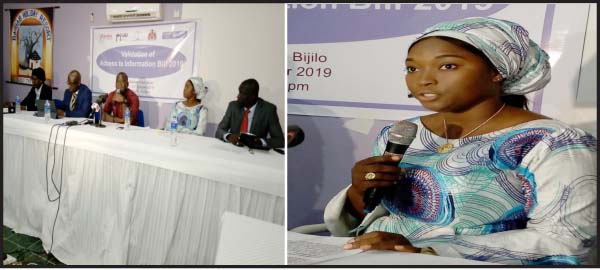
Justice
Minister Abubacarr M. Tambadou has blasted the government of Gambia’s exiled
former President Yahya Jammeh, saying it was ‘hostile’ to journalists.
“It
is common knowledge that the previous regime exhibited gross hostility to media
practitioners evidenced by the numerous legislations introduced to suppress
freedom of expression and its treatment to journalists,” he said in a statement
read on his behalf by state counsel Naffie Sissoho, at the validation of Access
to Information Bill yesterday.
He
said media practitioners operated under continuous harassment and oppressive
laws, saying the 1944 Newspaper Act, the Criminal Code of 1933 and the
Information and Communication Act of 2009 were all subjected to amendments with
very harsh and abusive provisions designed to stifle the right to freedom of
expression and information.
“In
recognition of the democratic right to freedom of expression, the government of
The Gambia wishes to ensure that all laws relating to freedom of expression are
consistent with the Constitution and international best practices.”
Justice
Minister Tambadou maintained that all existing laws seeking to restrain and
inhibit the fundamental rights of the people to free expression should be repealed
and replaced with appropriate legislation that facilitates the right of
expression in a democratic society.
He
said the government is very much committed in creating a transparent,
pluralistic and democratic society. “The bill will promote transparency,
accountability, good governance and development by educating people about their
rights, support sustainable development goals in respect to access to
information, ensure transparency among others,” he said.
Sheriff
Bojang Jnr, President of The Gambia Press Union said, “When we talk about
access to information, often a time minds go to journalists and journalism.
However, it goes beyond that because this has to do with every sector of our
society from the market women to taxi drivers and others.”
He
said with access to information there is lot to gain and lot to win
collectively as a nation and as a people, saying without access to
information,people will be losing many things, including basic information from
health, agriculture, foreign services among others.
“Our
goal today is to introduce an access to information law in The Gambia by
December 2019. We want to have an information law that all of us will be proud
of. We want to have an information law that will put The Gambia on the map as
the human right capital in Africa,” Salieu Taal, President of Gambia Bar
Association said.
He
said as a nation of democracy, having access to information law in place would
help ensure transparency and accountability of government. “Similarly, it will
help the citizenry to form informed opinions. The promulgation of an access to
information law will ensure good governance and its line with the government
strategic priorities the National Development Plan.”
John
Charles Njie, Chairman of TANGO, who also doubles as chairman of coalition on
Access to Information said the government has shown great commitment to
ensuring and showing willingness that the country’s democracy is strengthened
and committed to ensuring that there is freedom of information law by 2020.
Hawa
Sisay-Sabally, a veteran lawyer who drafted the bill said, “In drafting the
access to information bill, I took into consideration Gambia’s obligation to
international law particularly the African charter.”
She
said one of the obligations is that all the rights in the charter must be given
effect to by state parties, adding that one of such rights are right to access
to information.
Read Other Articles In Article (Archive)
15 Compounds Flooded in Kuntaur
Jul 3, 2008, 7:23 AM



